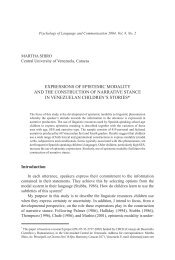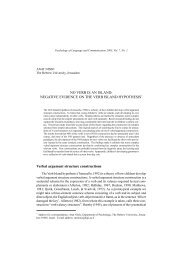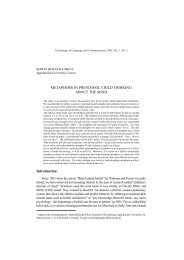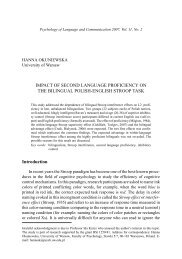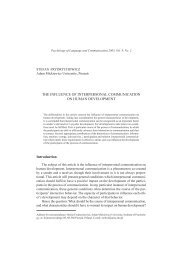Mikhail Videnov, Identifikatsiya po ezika v'z osnova na s'vremennata ...
Mikhail Videnov, Identifikatsiya po ezika v'z osnova na s'vremennata ...
Mikhail Videnov, Identifikatsiya po ezika v'z osnova na s'vremennata ...
- No tags were found...
You also want an ePaper? Increase the reach of your titles
YUMPU automatically turns print PDFs into web optimized ePapers that Google loves.
Psychology of Language and Communication 2007, Vol. 11, No. 2<br />
SHORT COMMUNICATIONS<br />
Book review:<br />
<strong>Mikhail</strong> <strong>Videnov</strong>, <strong>Identifikatsiya</strong> <strong>po</strong> <strong>ezika</strong> <strong>v'z</strong> <strong>osnova</strong> <strong>na</strong> s'vremen<strong>na</strong>ta<br />
b'lgarska rech (Identification by language on the basis of<br />
contem<strong>po</strong>rary Bulgarian). Sofia: Feneya 2007, 286 pp.<br />
<strong>Mikhail</strong> <strong>Videnov</strong> is one of the leading Bulgarian professors in modern Bulgarian<br />
sociolinguistics. During the last 10 years, <strong>Videnov</strong> published a number of<br />
very im<strong>po</strong>rtant books for Bulgarian sociolinguistics, such as: Sotsiolingvisticheskiyat<br />
marker [The sociolinguistic marker] (1998); Uvod v sotsiolingvistikata [Introduction<br />
to sociolinguistics] (2000); B'lgarskata ezikova <strong>po</strong>litika [Bulgarian language<br />
<strong>po</strong>licy] 2003; Diglosiyata s ogled <strong>na</strong> b'lgarskata ezikova situatsiya [Diglossia:<br />
With a special view to the Bulgarian language situation] (2005). All the<br />
works of <strong>Videnov</strong> over the last 30 years are focused on building the bases of<br />
sociolinguistics in Bulgaria and with his outstanding work and contribution, today<br />
it is <strong>po</strong>ssible to speak of the existence of the Bulgarian school of sociolinguistics.<br />
Moreover, M. <strong>Videnov</strong> has also contributed to European sociolinguistics<br />
with his publications in Europe and as a guest lecturer at several European universities.<br />
The newest book of <strong>Mikhail</strong> <strong>Videnov</strong> <strong>Identifikatsiya</strong> <strong>po</strong> <strong>ezika</strong> <strong>v'z</strong> <strong>osnova</strong> <strong>na</strong><br />
s'vremen<strong>na</strong>ta b'lgarska rech [Identification by language on the basis of contem<strong>po</strong>rary<br />
Bulgarian] (2007) presents a very interesting approach to the identification<br />
of speakers of different Bulgarian dialects, or identification of different<br />
ethnic backgrounds of speakers of the Bulgarian language. The target groups of<br />
the book are linguists, students in linguistics and professio<strong>na</strong>ls, for example, the<br />
<strong>po</strong>lice.<br />
The first chapter of the book presents the language situation in Bulgaria. Here,<br />
the author discusses phenome<strong>na</strong> like “language situation” and “speech situation”<br />
referring to Labov’s (1966) and Ferguson’s (1970) publications. <strong>Videnov</strong> describes<br />
the language situation in some parts of Bulgaria where Bulgarians speak a par-
84 SHORT COMMUNICATIONS<br />
ticular dialect. Special attention is paid to ethnic minorities (Turks and Roma) and<br />
their use of different varieties of Bulgarian which may be called “pidginize Bulgarian”.<br />
The second chapter informs more deeply about the existing different forms of<br />
present-day standard Bulgarian. This chapter deals with the forms of East Bulgarian<br />
vs West Bulgarian dialects, a<strong>na</strong>lyzing the different ways of pronunciation.<br />
Here, the author presents the Bulgarian dialectical atlas as a tool for territorial<br />
identification of dialectical speakers. Particular attention is paid to different types<br />
of slang (argots and jargons). The author demonstrates a deep knowledge of Bulgarian<br />
dialects and their specific features. All the detailed information given in<br />
the chapter aims to help <strong>po</strong>licemen and people who work in the <strong>po</strong>lice force, to<br />
identify speakers by their dialects.<br />
The third chapter of the book is the most interesting one, as it presents the<br />
different sociolinguistic markers that speakers use. <strong>Videnov</strong> divides the markers<br />
into several categories: birthplace and residence, age, educatio<strong>na</strong>l status, profession,<br />
sex. Furthermore, the author shows how a speaker can use different marker<br />
strategies in a speech situation. <strong>Videnov</strong> presents the different techniques of how<br />
a speaker can be identified by a<strong>na</strong>lyzing the written or s<strong>po</strong>ken language.<br />
In his preface, <strong>Mikhail</strong> <strong>Videnov</strong> states that the book establishes the bases of a<br />
new linguistic area, <strong>na</strong>mely, that of lingua-crimi<strong>na</strong>listics, and the book is the first<br />
successful attempt in this respect.<br />
The appendix includes a short dictio<strong>na</strong>ry of linguistic terms.<br />
The book of M. <strong>Videnov</strong> gives a new look at Bulgarian sociolinguistics. It<br />
shows the <strong>po</strong>ssibilities of contem<strong>po</strong>rary linguistics and sociolinguistics in new<br />
areas yet unexplored. It can be used by philology students and by linguists alike.<br />
References<br />
Ferguson, C. (1970). The role of Arabic in Ethiopia. A sociolinguistic perspective.<br />
Washington, D.C.: Center for Applied Linguistics.<br />
Labov, W. (1966). The social stratification of English in the New York City. Washington,<br />
D.C.: Center for Applied Linguistics.<br />
Hristo Kyuchukov



